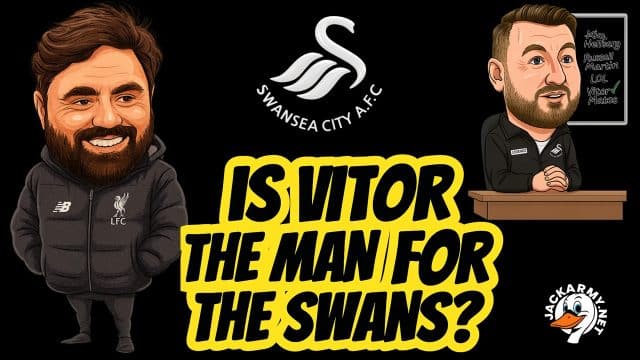Swansea City finds itself once again at a crossroads, with Vitor Matos emerging as the apparent favourite to take the manager’s job. The reaction among supporters has been predictably mixed. Some have already written him off, dismissing his credentials without much knowledge of what he brings to the table. Others are cautiously intrigued, pointing to his time alongside Jürgen Klopp at Liverpool as evidence of a pedigree worth respecting. Yet football rarely deals in guarantees. Paul Clement once worked under Carlo Ancelotti, and we all know how that story ended in South Wales. The truth is simple: working with great managers neither guarantees success nor ensures failure.
What makes this moment particularly difficult to judge is the lack of clear, in‑depth football knowledge at the club’s core. Fans are left piecing together fragments of information, trying to gauge whether Matos is the right man based on reputation rather than lived evidence. That uncertainty breeds cynicism, and cynicism is a dangerous currency in football. It shortens the rope before a manager has even taken his first training session.
Matos, if appointed, will walk into a club where patience is in short supply. Supporters have endured years of upheaval, too many managerial changes, and too many promises that failed to materialise. The instinct to groan at the first sign of trouble is understandable, but it is also self‑defeating. A new manager needs backing from day one, not suspicion. The rope he is given will already be shorter than most, and those who disagree with the appointment from the outset will be quicker to pull it tighter.
 This is the reality of modern football culture. Managers are judged before they have managed, and reputations are shredded before they have been earned. Swansea fans know this cycle all too well. Yet if Matos is indeed the man, the only fair course is to judge him on what he does here, not on assumptions or borrowed comparisons. The club needs stability, and the supporters need to resist the temptation to write the ending before the first chapter has even been written.
This is the reality of modern football culture. Managers are judged before they have managed, and reputations are shredded before they have been earned. Swansea fans know this cycle all too well. Yet if Matos is indeed the man, the only fair course is to judge him on what he does here, not on assumptions or borrowed comparisons. The club needs stability, and the supporters need to resist the temptation to write the ending before the first chapter has even been written.
Who is Vitor Matos?
Vitor Emanuel Soares Matos, born in 1988 in Vila Nova de Gaia, Portugal, is a coach whose journey has been anything but ordinary. Inspired by José Mourinho’s Champions League triumph with Porto in 2004, Matos set his sights on coaching from a young age. By 21, he was already managing Valadares’ under‑19s before moving to Trofense, and in 2011 he joined Porto’s academy. There he worked across age groups from under‑9s to under‑17s, while also serving as an analyst for the under‑19s and Porto B.
His career then took him abroad, spending two years in China with Shandong Luneng as a technical coordinator and youth coach. Returning to Porto in 2018, he became assistant manager of the B‑team before making the leap to Liverpool in October 2019. At Anfield, Matos was appointed elite development coach under Jürgen Klopp, tasked with bridging the gap between academy prospects and the first team. His role was pivotal in smoothing the pathway for young players, ensuring they were tactically and mentally prepared to step into senior football. Liverpool’s Premier League title in 2020 coincided with his early years on Merseyside, and he was widely credited as a “connector” between Klopp’s staff and the club’s youth system.
After five years at Liverpool, Matos left in 2024 alongside Klopp and Pepijn Lijnders. He briefly joined Lijnders at Red Bull Salzburg in Austria, before taking his first senior managerial role at Marítimo in Portugal’s Liga Portugal 2 in June 2025. Early results have been mixed, but his philosophy is clear: high pressing, fast transitions, and a commitment to intensity reminiscent of Klopp’s Liverpool.
At just 37, Matos has already built a résumé that spans Porto’s academy, Chinese football, Liverpool’s first team environment, and now senior management in Portugal. Whether Swansea appoint him or not, his career shows a coach shaped by elite influences but determined to carve his own path.
He Deserves Our Support
As referenced earlier, the instinct among supporters is often to judge a new manager before he has even stepped onto the training pitch. That reflex is understandable after years of upheaval, but it is also damaging. If Vitor Matos is appointed, he will inherit not just a squad but the weight of expectation from a fanbase that has grown weary of false dawns. The rope he is given will already be shorter than most, and those who doubted the decision from day one will be quicker to tighten it.
This is where patience becomes more than a virtue; it becomes a necessity. Swansea have cycled through managers at a pace that has eroded trust and stability. Each change has promised something new, yet too often delivered only disruption. Matos, whatever his background, cannot succeed if he is judged by the ghosts of those who came before him. He must be allowed to write his own story here.
Working alongside Jürgen Klopp at Liverpool is no small achievement, but as noted earlier, Paul Clement’s time with Carlo Ancelotti reminds us that pedigree alone is no guarantee. The lesson is not to dismiss Matos because of comparisons, but to recognise that his success will depend on what he builds in Swansea, not what he once observed elsewhere.
Supporters have a role to play in that process. Backing a manager from day one does not mean blind faith; it means giving him the chance to prove himself without the constant shadow of cynicism. After too many years of managerial changes, this appointment, if it is Matos, must be treated as a turning point. The club needs stability, and the supporters need to resist the temptation to write the ending before the first chapter has even been lived.
Football Operations Need Football People
As referenced earlier, one of the lingering concerns around Swansea City is not just who sits in the dugout, but who shapes the decisions that lead to that appointment. The names most often associated with the managerial hunt are Tom Gorringe and Adam Worth. Both are undoubtedly competent in their fields, and both have a place within the club’s structure. Yet for many supporters, their prominence in football operations raises questions.
Football is unlike any other business. It demands not only analytical expertise but also lived knowledge of the game’s rhythms, its culture, and its unique pressures. Gorringe and Worth may excel in their respective areas, but neither resonates within the wider football world in the way that seasoned football operators do. That disconnect is what unsettles supporters. It is not a criticism of their ability, but a reminder that football decisions carry a weight that spreadsheets and strategy alone cannot capture.
The recent investment of Luka Modrić, surreal as it still feels to see his name linked with Swansea, has not yet translated into the kind of football credibility that many hoped it would. A marquee name does not automatically propel the club toward better managers or players. What matters is the daily football knowledge embedded in the club’s decision‑making, and that is where supporters continue to feel a gap.
None of this is to dismiss the work being done behind the scenes. Gorringe and Worth are part of a broader team, and their skills have value. But as the search for a new manager unfolds, the question remains whether Swansea has enough football voices at the table. If Matos is appointed, his success will depend not only on his own qualities but also on the support and understanding of those guiding the club’s direction. Football operations need football people, and that truth should never be forgotten.
This concern is also another reason why cynicism surrounds the appointment. As much as those behind the scenes are judged on transfers, they will be heavily judged on this decision. The choice of manager is the most visible reflection of their influence, and supporters will not hesitate to measure their credibility against the outcome.
So what if…?
If Vitor Matos is indeed the man chosen to lead Swansea City, then the appointment will mark another significant chapter in the club’s modern history. He is young, ambitious, and shaped by experiences at some of the game’s highest levels. Yet he is also untested as a senior manager in British football, and that reality cannot be ignored.
Supporters will naturally debate the wisdom of the decision, but the truth is that no appointment comes without risk. What matters most is how the club and its fans respond. If Matos is given the time and trust to implement his ideas, Swansea could benefit from a fresh perspective and a manager determined to prove himself. If patience runs out too quickly, the cycle of instability will only continue.
As noted earlier, the concern over football operations and the influence of non‑football voices adds another layer of cynicism to the debate. Those behind the scenes will be judged not only on transfers but heavily on this appointment. For Matos, that means the stakes are higher than ever.
Ultimately, the choice of manager is the most visible reflection of the club’s direction. If it is Matos, he deserves the chance to show what he can bring. Supporters may remain hesitant, but the only fair path is to back him from day one. Swansea needs stability, and Matos, if appointed, should be given the rope to prove he can deliver it.

This article first appeared on JACKARMY.net.


21 replies
Loading new replies...
Michu
First Team Player
Michu
Roger Freestone
Roger Freestone
Alan Waddle
First Team Player
Alan Waddle
First Team Player
Lee Trundle
Alan Waddle
Join the full discussion at the Welcome to the Lord Bony Stand →